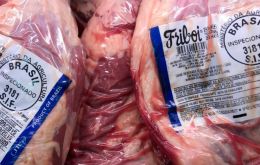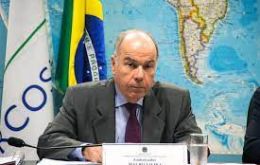MercoPress. South Atlantic News Agency
Economy
-
Monday, March 27th 2023 - 10:20 UTC
German Chancellor says “no reason to be concerned about Deutsche Bank”, system is stable and resilient

German Chancellor Olaf Scholz said during an EU summit last Friday in Brussels that Europe's banking system is “stable” and “ solid”. The leaders of the Eurozone countries met with the head of the European Central Bank, ECB, Christine Lagarde, to discuss the potential fallsou of several major banks collapsing in the US and Switzerland.
-
Monday, March 27th 2023 - 10:17 UTC
China reopens market for Brazilian beef exports, following a mad cow case scare

China reopened its market for beef exports from Brazil las week, Thursday (3/23). The information was passed on to the Minister of Agriculture, Carlos Fávaro, and to the Brazilian delegation in Beijing by the country’s General Administration of Customs (GACC).
-
Monday, March 27th 2023 - 10:00 UTC
Lula postpones visit to China because of pneumonia, but huge Brazilian delegation in business negotiations

Brazil informed Beijing that president Lula da Silva'a official visit to China had to be postponed because the Brazilian leader had contracted influenza and pneumonia. This however has not prevented a major business and investment summit between the two countries to continue in Beijing with the participation of a Brazilian delegation of some 240 members.
-
Saturday, March 25th 2023 - 10:33 UTC
Falklands retains global A+ investment rating; financial and political stability crucial for the achievement

The Falkland Islands Government is pleased to confirm that, following a detailed review of updated fiscal and economic information, supported by a process of confidential interviews with FIG officers and other stakeholders, including representatives of the business community, S&P Global Ratings have confirmed the sovereign rating for the Falkland Islands remains at A+ with a stable outlook.
-
Saturday, March 25th 2023 - 10:27 UTC
XXVIII Ibero-American Summit focused on economic recovery

Heads of State and Government convened in Santo Domingo for the XXVIII Ibero-American Summit which is focused on post Covid-19 pandemic economic recovery in a world hit by the conflict between Russia and Ukraine.
-
Saturday, March 25th 2023 - 10:26 UTC
Former Brazilian President Rousseff to chair BRICS Bank

Former Brazilian President Dilma Rousseff has been elected Friday to head the New Development Bank (NDB), also known as the BRICS Bank to replace Marcos Troyjo, who had held the post since July 2020. Rousseff will remain at the helm of the Shanghai-based financial institution until the end of Brazil's mandate in July 2025. Each BRICS country (Brazil, Russia, India, China, and South Africa) chairs the bank for rotating five-year terms. She will take office later next week during President Luiz Inácio Lula Da Silva's visit.
-
Friday, March 24th 2023 - 10:46 UTC
IMF explores possible political scenarios with Uruguayan presidential candidates

The annual monitoring mission of the International Monetary Fund (IMF) recently concluded its nearly two-week visit to Montevideo, providing a positive assessment of Uruguay's economy and the government's reform efforts. However, the mission also gauged the pulse of Uruguay's political landscape ahead of the 2024 elections, weekly newspaper Búsqueda informed.
-
Friday, March 24th 2023 - 10:00 UTC
Argentina's 2022 GDP shows improvement from previous year

Argentina's Gross Domestic Product (GDP - the sum of all products and services traded) grew by 5.2% in 2022, a 1.9% improvement from 2021, the National Institute of Statistics and Census (Indec) reported Thursday in a study that also showed that last year's fourth quarter GDP was 1.9% higher than that of the same period of 2021, but 1.5% below the third quarter of 2022.
-
Thursday, March 23rd 2023 - 10:53 UTC
Argentine gov't to pesify state-held securities in foreign currency

Argentina's Economy Minister Sergio Massa and his aides held a working lunch Wednesday with a group of businessmen from banks, insurance companies, and investment funds, during which the new measures adopted to control a ballooning exchange rate between the local currency and the US dollar were outlined.
-
Thursday, March 23rd 2023 - 10:51 UTC
Brazil would like to see Argentina join BRICS, FM says

Brazil's Foreign Minister Mauro Vieira told the website Metrópoles that his country would like to have Argentina join the BRICS group, but insisted that for such a move to happen it would depend on the consensus from the other bloc members (Russia, India, China, and South Africa).
